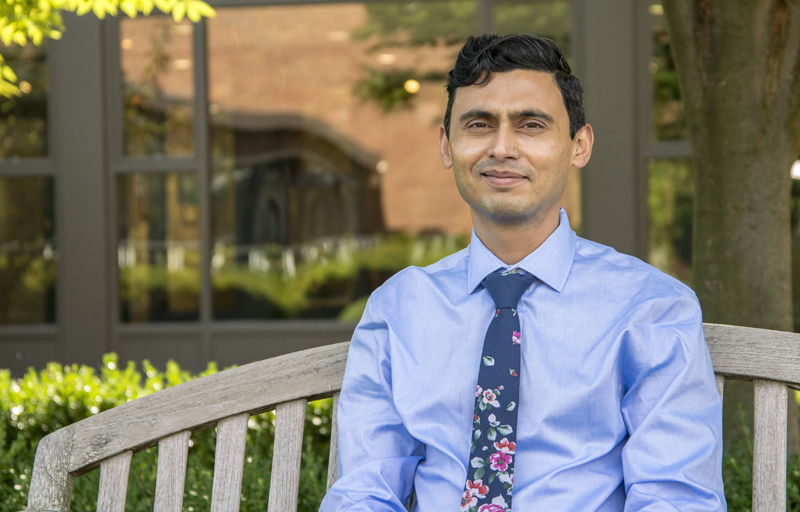Harpur student spotlight: Muhammad Waqar Azeem
English doctoral student studies relations between Pakistan and United States

Muhammad Waqar Azeem has always planned to use his education to teach English to students in his native Pakistan.
“With Pakistan being a post-colonial state and being under British rule for a long time, English is a language of privilege,” Azeem said. “I want to make the language more widespread in my country.”
Azeem is completing his education by pursuing his doctorate in English at Binghamton University.
Before coming to Binghamton, Azeem completed a self-taught degree, equivalent to an American bachelor’s degree, in his home village before moving to Lahore, a larger city in Pakistan, to earn a master’s degree at Government College University.
Azeem then sought English doctorate programs in the United States. In Pakistan, when applying to graduate schools abroad, students do not apply to a specific school. Rather, they apply for a scholarship and a committee evaluates and matches them up with a school whose programs meet their needs.
“Binghamton was chosen for me, but the (English) program was in line with what I wanted to do and was offering the kinds of classes I wanted to take,” Azeem said. “If I was given choices before they finalized it for me, Binghamton would have been a top choice because of the program.”
He was accepted into Binghamton’s program and began his studies in the fall of 2014. Although Azeem’s journey to Binghamton was a long process — dealing with travel documents and scholarship applications — the research he has conducted here came naturally to him.
Azeem’s dissertation is focused on the effects that the relationship between the United States and Pakistan has had on his home country.
“My dissertation involves a personal aspect,” he said. “From 2007 through 2013, things were hard in Pakistan. There were acts of extremism and suicide bombings, which became very common in Lahore.”
These events were all occurring while Azeem was writing his dissertation proposal. He researched the relationship between the acts of extremism happening in Pakistan and the United States’ relations with Pakistan, as well as how the two nations are fighting the war on terrorism as allies post-9/11. He discovered there were only statistical connections.
Azeem is now examining the link between terror and war statistics and the figurative language of storytelling.
“Storytelling can have a deeper influence on the minds of the leaders than statistical analysis or statistical representation,” Azeem said. “If you say ‘50,000 people were killed in Pakistan after 9/11 because of suicide bombing,’ that does not have the same impact as an emotional story that says what happened to those people.”
Through storytelling, Azeem shows that the U.S.-Pakistan relationship is more than just statistics. The goal Azeem is striving for is action from leaders who need to understand that the people impacted are more than numbers.
“When we study literature, there is a tendency to isolate social reality from literary analysis,” Azeem said. “That is a trend I would like to reverse. Literature has a lot of potential for social change, starting with pedagogical interaction.”
After he completes his doctorate, Azeem plans to move back to Pakistan to teach the U.S.-Pakistan relationship through storytelling at a college level.
He said his time in Binghamton has changed him in ways that he couldn’t have imagined.
“Binghamton has a very diverse population and culture. It was a surprise to me because I had never heard of the place before I came and I wasn’t expecting as much diversity,” he said. “But as I spent more time here, I realized how much like home Binghamton could become so quickly.”
